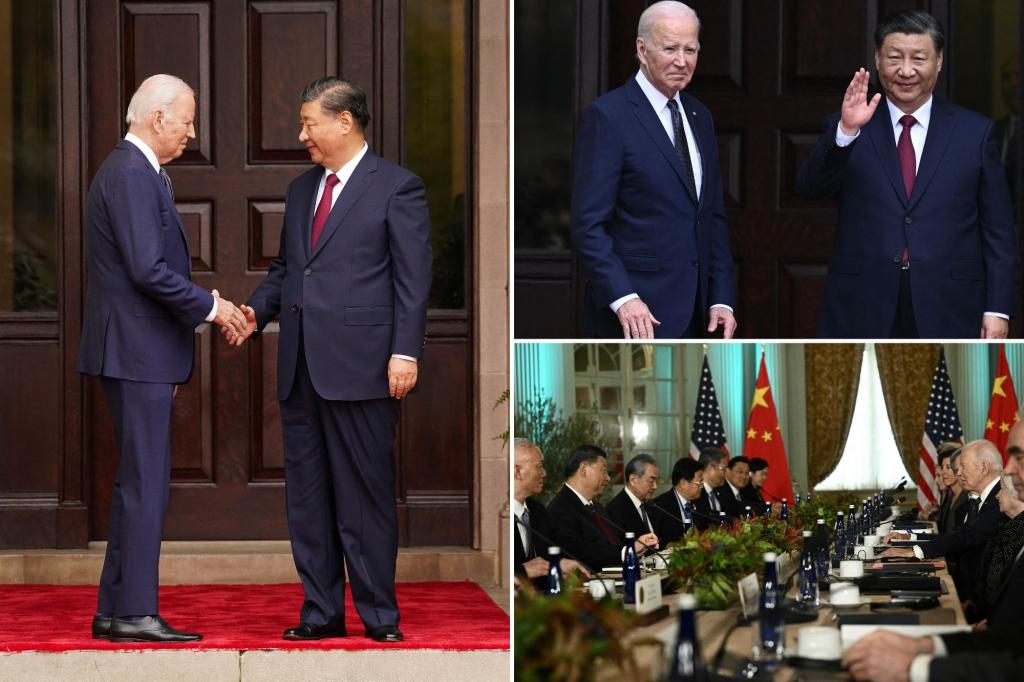WOODSIDE, Calif. — Chinese President Xi Jinping publicly rebuked efforts to reduce US economic dependence on China Wednesday while meeting with President Biden for the first time on American soil.
“For two large countries like China and the United States, turning their back on each other is not an option,” the 70-year-old strongman told Biden, 80, across a boardroom table at the Filoli estate south of San Francisco.
“It is unrealistic for one side to remodel the other and conflict and confrontation has unbearable consequences for both sides.”
Xi added that “planet Earth is big enough for the two countries to succeed. And one country’s success is an opportunity for the other.”
Biden, whose family’s dealings in China are a central focus of a House Republican impeachment inquiry, opened the exchange by reminiscing about his prior travels with Xi during his eight-year vice presidency.
“We spent many hours together over the last 10 or 12 years and to host you in the United States is a great honor and a pleasure,” Biden said.
President Biden and Chinese President Xi Jinping shook hands Wednesday to kick off a bilateral meeting with talks expected to cover Chinese exports of fentanyl, trade and regional disputes. REUTERS
Xi replied through a translator, “Coming here, I think of your trip to China when I was the vice president of China. We had a meeting — it was 12 years ago — I still remember our interactions very vividly. And it always gives me a lot of thoughts.”
Biden was involved in both of his family’s major business relationships with Chinese state-backed ventures, but he has denied personally profiting from them.
In his opening remarks, Biden specifically mentioned three areas on which he’d like to focus — climate change, counter-narcotics and governance of artificial intelligence.
The talks were expected to cover fentanyl, the largely China-sourced synthetic opioid that has killed roughly 200,000 Americans since Biden took office.
According to the latest CDC data, fentanyl is still killing more than 200 US residents each day.
Biden and Xi are also expected to discuss the US stance toward territorial disputes in the South China Sea, including a recent naval incident involving the Philippines.
REUTERS
Xi appeared to work in a dig during his opening comments at former President Donald Trump’s tariffs against an array of Chinese goods, which Biden has kept in place despite subordinates studying their repeal.
“Industrial and supply chains are still under the threat of interruption and protectionism is rising. All these are grave problems,” Xi said.
“The world has emerged from the COVID pandemic but is still under its tremendous impacts. The global economy is recovering, but its momentum remains sluggish,” he said.
The leaders of the world’s two largest economies shook hands ahead of a more than two-hour meeting including their advisers, which was followed by a working lunch.
Xi conspicuously did not use one of the standard white porcelain coffee mugs provided for meeting participants and instead used what appeared to be a to-go cup in a possible security measure.
Xi attracted attention by using a different coffee cup than other meeting participants.AFP via Getty Images
Outside the historic mansion built in 1915 by a former gold-mining baron, protesters rallied for and against Xi and his Chinese Communist Party.
A large group of pro-Xi demonstrators wore red, but a Post reporter could not find anyone who spoke English among them.
An anti-Xi group featured a demonstrator brandishing a Chinese flag with a swastika drawn over it and another person dressed in a “Winnie-the-Pooh” costume — in reference to thin-skinned Xi’s censorship of the cartoon after internet memes compared him to the simpleminded bear.
Ahead of the talks, Biden publicly rejected the terminology of “decoupling” economically from China — a term used by Trump and Republicans — though his administration has approved subsidies to move microchip, rare-mineral production and other manufacturing to the US.
The American president was scheduled to give a press conference without Xi later Wednesday. Xi and Biden previously met in-person last year in Bali, Indonesia, and virtually in 2021.
US officials gave vague but optimistic projections for the meeting — but stopped short of confirming a report that Xi would agree to crack down on exports of fentanyl.
Biden has faced Republican pressure to push Xi on drug export and for transparency on the origins of COVID-19, which killed more than 1.1 million Americans after what some US agencies assess was likely a Wuhan lab leak. Biden said in a 2021 statement that “[t]he world deserves answers, and I will not rest until we get them,” but he has rarely mentioned it since then.
A potential breakthrough on fentanyl was teased in news reports ahead of the summit.
US officials gave projections for the meeting but stopped short of confirming a report that Xi will agree to crack down on exports of fentanyl. AFP via Getty Images
Biden has kept in place a raft of tariffs on Chinese goods that were imposed by former President Donald Trump. AFP via Getty Images
The White House for months has weighed lifting some sanctions over alleged Chinese abuses against Uyghurs in western China in exchange for more action to stem exports of fentanyl, which can kill often unwitting users in extremely low doses.
A senior administration official told The Post, “I think the two leaders will talk about steps going forward, which we believe will be deeply consequential in addressing the scourge of fentanyl in the United States.”
“Time will tell,” the official added.
“This is not something that you can make judgments on immediately, but we believe that China has taken it seriously,” the official said. “I think we’ll see progress on this.”
Those two issues have the most propensity to cause a full-blown conflict between the two adversaries, defense experts say. While China views both the South China Sea and Taiwan its own, the US holds that the sea – through which roughly 21% of global trade passes – is international waters and considers Taiwan’s sovereignty unsettled.
Xi has made “reunification” with Taiwan his top goal, while the Biden administration has said the US military would get involved should Beijing attempt a hostile takeover of the democratic, sovereign island.
Despite the Taiwan issue being one of the most contentious points between the two nations, senior administration officials shied away from reporters’ questions regarding how Biden would broach the topic with Xi.
While multiple officials told The Post that Biden would “reiterate” the US’ “unchanged One China Policy,” Beijing repeatedly accuses Washington on reneging on the understanding, which has been in place since the 1970s.
Biden has faced Republican pressure to push Xi for transparency on the origins of COVID-19, which killed more than 1.1 million Americans.
AFP via Getty Images
Some of that tension lies in semantics – Washington’s One China Policy differs from Beijing’s One China Principle. While China’s “principle” holds that Taiwan is its sovereign territory, the US’ “policy” merely acknowledges China’s position, but does not take a firm stance in the matter.
Ahead of the summit, senior administration officials were hopeful that the summit would bring a return of military-to-military communications after Beijing broke them off in protest of then-House Speaker Nancy Pelosi’s August 2022 visit to Taiwan.
Such international communications – even among adversaries – are considered among the most basic necessities for avoiding unintentional conflicts. Even during the Cold War, the US and Russia kept phone lines open to avoid miscalculations.
The Biden administration got a taste of how frustrating – and dangerous – lacking communication channels can be after Beijing sent a spy balloon through US airspace earlier this year, but refused to answer Washington’s calls, senior officials told The Post this week.
“I do think there are some mechanisms that were used during the Cold War could be repurposed to ensure that when US and Chinese forces are operating in closer proximity, we have greater confidence that in crisis or if there’s any ordinance, that would be the ability to communicate,” a senior administration official told reporters late Wednesday. “We think that’s responsible.”
The official hinted that China’s relatively recent rise as a global power may be a factor in its refusal to partake in such emergency communications over the past year.
“We’ve been a superpower for a long time. We understand the importance of these things that can cause unintentional escalation or crisis,” the official said. “And I will say we continue to see certain operations of Chinese pilots and other military operators that are dangerous, provocative and risk [crises].
National security council spokesman John Kirby told reporters Wednesday that US officials expected the meeting to enhance further cooperation “up and down the chain of command” between American and Chinese officials.
“I’ll let the president speak for the meeting when it’s over and how he found it and where he thinks his personal relationship with Xi is gonna go. But I think we’re all expecting that this will be a productive discussion today,” Kirby said.
Biden met with Xi as House Republicans pursue an impeachment inquiry into Biden’s role during and after his vice presidency in his son Hunter Biden and brother James Biden’s foreign dealings, including in China.
GOP lawmakers have accused Biden of being compromised in his dealings with China due to his family’s business interests.
Biden is meeting with Xi as House Republicans pursue an impeachment inquiry into Biden’s role in connection with his family’s foreign dealings.
AFP via Getty Images
House Speaker Mike Johnson (R-La.) told The Post last week that he believes Biden is “soft” on China and that “it probably has something to do with business relationships and may very well involve Hunter and James Biden and some of the deals they made over there.”
Trump, 77, who is seeking a rematch against Biden in next year’s election, claimed in an August video that Biden “is petrified of China because they know exactly how much money was given to him and they know exactly where it is.”
Hunter Biden, 53, co-founded a state-backed Chinese investment fund called BHR Partners in 2013 just 12 days after joining his father aboard Air Force Two for an official trip to Beijing.
Joe Biden had coffee with BHR’s incoming CEO Jonathan Li during the trip and later spoke with Li on speakerphone during a subsequent visit to China by the then-second son, former Hunter Biden business partner Devon Archer told the House Oversight Committee during a July deposition.
Hunter held onto a 10% stake in BHR through at least part of his father’s first year as president and the terms of his divestment remain murky.
BHR has played an influential role in acquiring foreign assets for China and helped facilitate a Chinese firm’s purchase of a Congolese cobalt mine from US and Canadian companies in 2016. Cobalt is an important material for making electric vehicle batteries.
In a second Chinese business relationship, Hunter and James Biden received at least $6.1 million in 2017 and 2018 from CEFC China Energy, a since-defunct company that was reputed to be a component of the Chinese government’s “Belt and Road” foreign influence initiative.
CEFC wired $3 million in March 2017 to Biden family associate Rob Walker — less than two months after Joe Biden left office as vice president — of which $1,065,000 went to Hunter Biden, James Biden, and Hallie Biden, who was married to Joe Biden’s late son Beau before dating Hunter.
Joe Biden was at one point penciled in for a 10% cut in the CEFC venture, according to a May 2017 email written by Biden family associate James Gilliar, who referred to the politician as the “big guy.”
CEFC sent another $5.1 million to Biden family-linked accounts within 10 days of a threatening July 30, 2017, text message from Hunter Biden to a China-based CEFC associate, in which he threatened his father’s wrath.
“I am sitting here with my father and we would like to understand why the commitment made has not been fulfilled,” Hunter Biden wrote.
President Biden and Chinese President Xi Jinping are meeting for the second time in person as their nations’ leaders following a summit last year in Bali, Indonesia.
AP
Members of the military await the arrival of President Biden and Chinese President Xi Jinping during the Asia-Pacific Economic Cooperation Leaders’ Week in Woodside, California, on November 15, 2023. AFP via Getty Images
“Tell the director that I would like to resolve this now before it gets out of hand, and now means tonight,” Hunter wrote. “And, Z, if I get a call or text from anyone involved in this other than you, Zhang, or the chairman, I will make certain that between the man sitting next to me and every person he knows and my ability to forever hold a grudge that you will regret not following my direction.”
“I am sitting here waiting for the call with my father,” he added.
President Biden told The Post in June that he was not involved with the shakedown message and has broadly denied any misconduct regarding his family’s dealings, blustering “Where’s the money?” in June when asked about an FBI informant’s claim he was involved in a $10 million Ukraine bribery scheme involving Hunter’s former $1 million-per-year job at gas company Burisma.
Categories: Trending
Source: thtrangdai.edu.vn/en/



